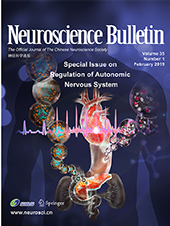Volume 35, Issue 1, 2019
 [Cover]
[Cover]The autonomic nervous system (ANS) integrates involuntary physiological activities of visceral organs that are vital for survival, controlling the heart rate, blood pressure, breathing, gastrointestinal contraction and secretion, and electrolytes and fluid homeostasis. Many studies have indicated that when the function of ANS is altered, this may lead to autonomic neuropathy. However, the underlying mechanisms of autonomic neuropathy in the pathological states are not well understood and have yet to be elucidated.
In this special issue, Prof. Qing-Hui Chen organized and gathered a number of investigators to contribute original research articles to address the underlying neural mechanisms and significance of autonomic dysfunction in the pathogenesis of these diseases and provide potential intervention. Furthermore, the invited review articles contribute to the recent understanding of the mechanisms of autonomic function and dysregulation, which may provide novel approaches and strategies to decipher the complicated autonomic neural network.
In the cover story of this special issue, Yang et al. found that decreased β-cell function is closely associated with the presence of CAN in newly-diagnosed type 2 diabetic patients. Better residual β-cell function might be associated with decreased incidence of CAN in this population. The cover image shows the close association between β-cell function and CAN. See pages 25-33. (Cover image provided by Dr. Xubin Yang).